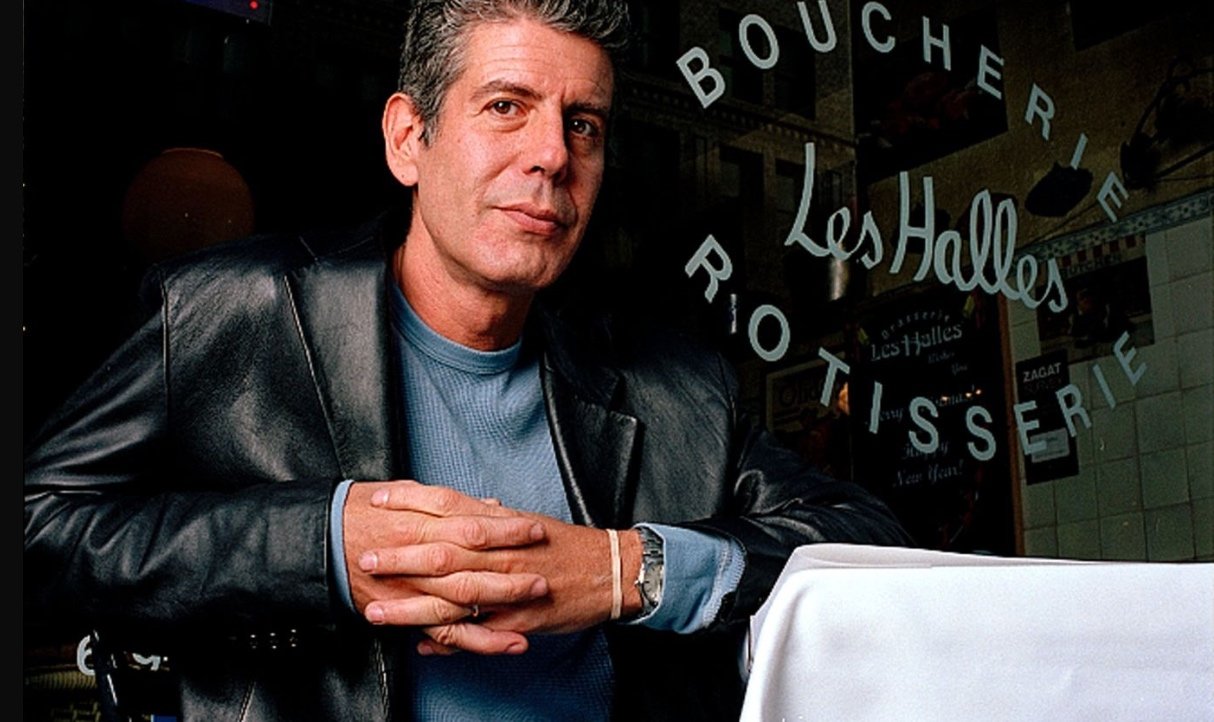Lessons from Anthony Bourdain
“Never order fish on Monday,” Anthony Bourdain wrote in his 2000 bestseller autobiography, Kitchen Confidential: Adventures in the Culinary Underbelly, where he explained that restaurants typically work with supplies purchased the previous Thursday. This unexpected admission stuck in my mind like a stubborn gum on my hair that wouldn’t come off.
But then, again, Bourdain was anything but predictable. Even in death.
(Image: David Scott Holloway via CNN)
He was the maverick (some say rock star) of the culinary world. He lived a frantic life by his own rules and on his own terms with no apologies. He crossed boundaries. It has been said that had Kitchen Confidential not sold like hot cakes, he would have been forever blacklisted for the unabashed debauchery and behind-the-scenes details that exposed the F&B industry. But for hundreds of readers like me, I found the book refreshing – a satisfying appetiser, a palate-pleaser that made me crave his hot-and-cold smorgasbord of unfiltered, no bull***t takeaways on food, people, places and cultures.
“He was the epitome of cool, a sad-smiling Jersey boy who combined supremely high standards with the underappreciated art of not giving a shit in ways that seemed to excite both sexes,” wrote Charles Leerhsen in the prelude of his controversial book Down And Out In Paradise: The Life Story Of Anthony Bourdain.
Leerhsen continued: “He had the best job (if you could call it that) in the world, the best life in the world, applauded wherever he went. Cigarettes, booze and time all looked good on him. So the question is, how did he get to the point where he wanted to kill himself? How does that scenario even begin to make the slightest bit of sense?”
Leerhsen’s 278-page “unauthorised” bio is not an easy read. It’s packed with vivid never-before-revealed details of the complex life, both messy and sad, of the celebrated haute cuisine chef. Who knows what triggered Bourdain to take his own life in a French hotel room in 2018? His life and death have been dissected plenty by mental health experts and the media, which I’m not going to repeat here.
My plan was to write a book review. However, I shifted gears halfway through Leerhsen’s book to focus on the resonating lessons Bourdain left behind. I’d rather remember the intelligent, multidimensional lanky American I briefly met back in 2004 in Singapore when we were pitching a culinary journey in New Zealand for season one of his then soon-to-launch No Reservations show. The three-hour dinner meet was most satiating.
Of course, all I had was a Bourdain degustation. Nevertheless, it left me with a lasting first impression: He was a master observer. His eyes spoke volumes as he quietly considered the people and stuff around him. He knew more than he let on, but when he did he was punchy, spontaneous and unpretentious. He said what he meant, and meant what he said.
Here are the resonating lessons from Bourdain I’ve picked up from reading some of his 14 books (Kitchen Confidential, Nasty Bits, No Reservations, Medium Raw, A Cook’s Tour; and watching his TV shows (A Cook’s Tour, No Reservations, Parts Unknown, Raw Craft, The Layover).
“Sleep on the floors if you have to. Find out how other people live and cook. Learn from them.”
Bourdain was a people person. He believed that everyone has a story. The only way to know and appreciate a person’s story is to spend time listening and understanding the backstory. He did not discriminate against anyone. Whether he was sampling food on the streets of Bangkok, slurping a bowl of noodles in Vietnam in the company of former President Barack Obama, taking a dip in an Onsen in Japan, enjoying Guinness with the locals in an Irish pub… Bourdain soaked in their stories like a sponge, eager to capture the vastly eclectic lives and cultures in parts unknown. We could all take a page off his playbook where humility and community mean thinking of ourselves less.
“I always entertain the notion that I’m wrong, or that I’ll have to revise my opinion. Most of the time that feels good; sometimes it really hurts and is embarrassing.”
Bourdain was known for telling it as it is. His authenticity was palpable. It was refreshing. He never practised self-censorship. His views may be flawed or disagreeable to some but one thing that clearly came through was the message: Be true to yourself. Let your voice be heard. Keep it real.
“Skills can be taught. Character you either have or you don’t have.”
The three Michelin-starred chef’s character and the values he stood for were shaped by his booze-soaked, drug-infused early life as well as punishing hours in various kitchens under exacting mentor-chefs. Somewhere along the way, he was humbled by the hard lessons learned, which he passed on to his young apprentices, colleagues and fans.
“Without experimentation, a willingness to ask questions and try new things, we shall surely become static, repetitive and moribund.”
Bourdain admitted he was not the best chef in the world. But that did not stop him from learning and understanding the one passion that fueled him: food. To quench his insatiable thirst he turned his love of cooking into a career in writing and traveling where food and people were the centrepieces in all his narratives. In so doing, his quest led to many doors unexpectedly opening. Conversely, he encouraged us to keep chasing our dreams, to be open to all possibilities, and to go through life unconstrained, for we never know which door would be opened that could change our life.
“I’m a big believer in winging it. I’m a big believer that you’re never going to find [the] perfect city travel experience or the perfect meal without a constant willingness to experience a bad one. Letting the happy accident happen is what a lot of vacation itineraries miss, I think, and I’m always trying to push people to allow those things to happen rather than stick to some rigid itinerary.”
Bourdain never chickened out from trying anything new, at least once. Among the most bizarre foods he had eaten were balut (foetal duck egg), a beating cobra heart, maggot fried rice and raw seal eyeball. What he was telling us was to take in all that life has to offer including the nasty bits. Carrying a roadmap is good but sometimes it is best to just go with the flow, be spontaneous, take time to explore the unknown because in reality life has no GPS.
“The greatest sin is mediocrity.”
The secret to success is taking risks. It means moving the needle a few notches higher than the accepted norm, and not doggedly conforming to conventional practices of how things are done. Ultimately, if we settle for mediocrity we’ll become mediocre. So we should never apologise for having high standards.
“Travel isn’t always pretty. It isn’t always comfortable. Sometimes it hurts, it even breaks your heart. But that’s okay. The journey changes you; it should change you. It leaves marks on your memory, on your consciousness, on your heart, and on your body. You take something with you. Hopefully, you leave something good behind.”
Bourdain journeyed to more than 100 places. Each city or county left an indelible mark on him as much as he left a mark on the people he met along the way. Whether traipsing around the world or driving through life’s highways, he essentially advocated the idea to get out of our comfort zone, try something new, connect with people and places, be open-minded, be fearless and create lasting memories.
It’s been nearly five years since the tragic passing of Bourdain. But as his close friend and book editor Karen Rinaldi wrote in her tribute piece entitled Why Anthony Bourdain Matters: “We can be grateful that among the gifts he left behind are his books and TV series — so redolent of his voice — a treasure trove to which fans can return again and again.”
Debbie | ws
(Images sourced from CNN’s Parts Unknown) | Why AnthonyBourdain Matters | Things You Didn’t Know About Anthony Bourdain |








